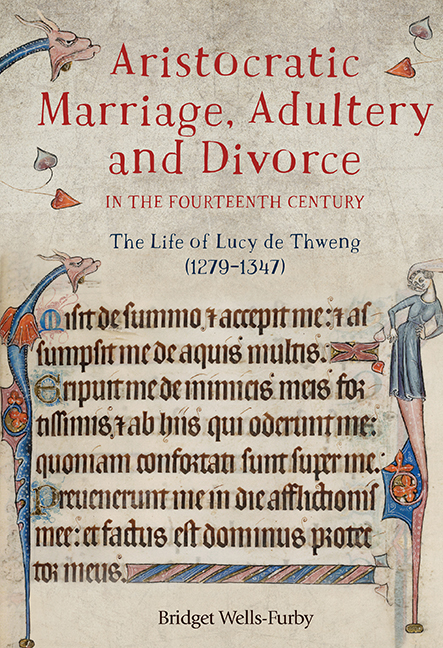 Aristocratic Marriage, Adultery and Divorce in the Fourteenth Century
Aristocratic Marriage, Adultery and Divorce in the Fourteenth Century Book contents
- Frontmatter
- Contents
- List of Illustrations
- Acknowledgements
- List of Abbreviations
- Note on the Text
- Introduction
- Map
- 1 Birth and Family; Inheritance and Disinheritance
- 2 Wardship and First Marriage
- 3 Separation and Divorce
- 4 Adultery and Fornication
- 5 Second Marriage
- 6 Widowhood
- 7 Third Marriage
- 8 Death
- Summary and Conclusions
- Bibliography
- Index
Summary and Conclusions
Published online by Cambridge University Press: 04 April 2019
- Frontmatter
- Contents
- List of Illustrations
- Acknowledgements
- List of Abbreviations
- Note on the Text
- Introduction
- Map
- 1 Birth and Family; Inheritance and Disinheritance
- 2 Wardship and First Marriage
- 3 Separation and Divorce
- 4 Adultery and Fornication
- 5 Second Marriage
- 6 Widowhood
- 7 Third Marriage
- 8 Death
- Summary and Conclusions
- Bibliography
- Index
Summary
This study of the life of Lucy de Thweng has been an opportunity to explore many of the ways in which the contemporary conventions of marriage and sexual behaviour were flouted or ignored by women, as well as the men, of landholding families. It has shown how these departures might affect the prosperity and descent of landed estates, the foundation of their holders’ local and national authority and their lineage, and thus of all that was most important to them, because marriage was the forum for the orderly succession to estates by the procreation of ‘legitimate’ children. Secular and church law combined to ensure that women lived their lives subject to their menfolk, both legally and physically, but also provided them with rare opportunities to exert their own independence. The study has also shown how the rise of the settlement by grant and regrant on conditional terms allowed landholders to evade the old common-law rules of succession to land and some of the ways they might use that freedom, to the benefit or detriment of women.
The greatest drawback in consideration of Lucy de Thweng's life, and indeed of the vast majority of her female contemporaries, is the nature of the evidence. Medieval historians are never more at the mercy of their source material than when considering personal feelings and trying to deduce them from stray incidental references. This applies most of all to the intimacies of marriage and sexual relationships. The idealist theories of church and laity are clear enough, but it is equally clear that the reality of marriages that did not attain these ideals might be shrouded very thoroughly by the surviving evidence. The outlines of Lucy's life are well established and indisputable but it is visible only in her varying relationships with men: with Meinill, her three husbands and her uncles. Almost certainly, this is a true reflection of the lives of the great majority of women of her time and rank, but her own feelings and motives will remain forever uncertain and are simply a matter of interpretation. She has been portrayed as a woman whose promiscuous irresponsibility created trouble in numerous Yorkshire families and local society, and as one whose life was a failure because it did not follow the common lines of marriage and procreation and there is nothing to show that she was either literate or notably pious.
- Type
- Chapter
- Information
- Aristocratic Marriage, Adultery and Divorce in the Fourteenth CenturyThe Life of Lucy de Thweng (1279–1347), pp. 196 - 208Publisher: Boydell & BrewerPrint publication year: 2019


